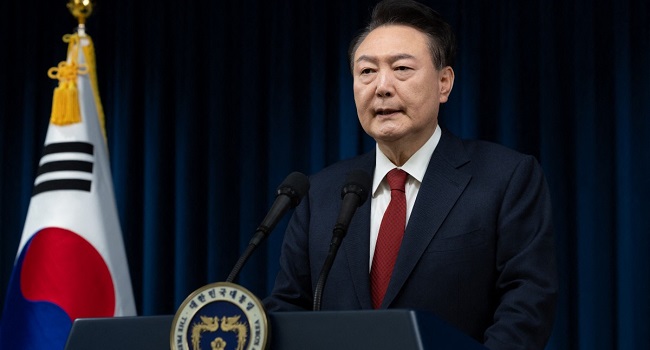In South Korea, the situation continues to unfold as President Yoon Suk Yeol’s office was raided on Wednesday amid an ongoing investigation into his declaration of martial law.
Meanwhile, prison authorities reported that the country’s former defense minister, Kim Yong-hyun, attempted to take his own life just before his formal arrest concerning the events of December 3.
The dramatic events saw military forces and helicopters dispatched to parliament, aiming — but ultimately failing — to prevent lawmakers from voting down Yoon’s martial law decree.
President Yoon, who remains deeply unpopular, is already under a travel ban as part of a broader probe into his inner circle for alleged involvement in what authorities are calling an insurrection.
On Wednesday, South Korea’s special investigation unit carried out raids on the presidential office, the National Police Agency, the Seoul Metropolitan Police Agency, and the National Assembly Security Service. The official statement offered no further details regarding the raids.
Kim Yong-hyun, detained since Sunday, attempted suicide shortly before midnight on Tuesday (1500 GMT Tuesday) while in custody, according to the justice ministry and prison officials. He was confirmed to be in good health on Wednesday.
Kim faces charges of “engaging in critical duties during an insurrection” and “abuse of authority to obstruct the exercise of rights.” His lawyers have stated that he accepted full responsibility, claiming his subordinates merely followed his orders.
Alongside Kim, former interior minister and the general responsible for the martial law operations were also slapped with travel bans. Two high-ranking officials, Cho Ji-ho, commissioner general of the Korean National Police Agency, and Kim Bong-sik, head of the Seoul Metropolitan Police Agency, were also arrested early Wednesday.
North Korea weighed in on the developments for the first time, referring to the unrest as “chaos” and condemning Yoon’s martial law decree as evidence of a “fascist dictatorship.” The North accused Yoon of exploiting the situation to suppress freedoms under the guise of defending against external threats, particularly those from North Korea.
Relations between the two Koreas have worsened, with North Korea continuing to launch ballistic missiles in violation of UN sanctions. Reports also suggest that Kim had ordered strikes against sites from which North Korea launched trash-carrying balloons, though his subordinates reportedly refused. Allegedly, he also ordered drones sent to Pyongyang, possibly intending to provoke conflict as justification for martial law.
Yoon barely survived an impeachment vote on Saturday, despite tens of thousands of South Koreans protesting in freezing conditions, demanding his resignation. Smaller protests have persisted since, with public support for Yoon at an all-time low.
A special task force within Yoon’s People Power Party (PPP) proposed a plan on Tuesday for his resignation in February or March, followed by fresh elections in April or May. However, the proposal has yet to be fully endorsed by the party.
Even if the resignation plan is adopted, the opposition may attempt another impeachment motion, needing just eight members from Yoon’s party to secure the necessary two-thirds majority. Last week, two PPP lawmakers voted in favor, with two others expressing support on Tuesday.
